欢迎访问我的GitHub
这里分类和汇总了欣宸的全部原创(含配套源码):
https://github.com/zq2599/blog_demos
spring-cloud-square系列文章
- 五分钟搞懂spring-cloud-square
- spring-cloud-square开发实战(三种类型全覆盖)
- spring-cloud-square源码速读(spring-cloud-square-okhttp篇)
- spring-cloud-square源码速读(retrofit + okhttp篇)
本篇概览
- 本文是《spring-cloud-square学习》系列的终篇,上一篇咱们了解了spring-cloud-square-okhttp库的源码和原理,今天提升一点难度,看看spring-cloud-square的另一种类型的源码:spring-cloud-square-retrofit,也就是下图红框中的那种:

源码分析目标
- 接下来开始分析spring-cloud-square-retrofit工程的源码,如下图红框所示:

- 本篇目标非常明确,只搞清楚一件事:在使用spring-cloud-square的时候,以前文的consumer-retrofit-okhttp子工程为例,为什么咱们只写了HelloService接口,但却能通过Autowired注解使用HelloService的实现类?
提前小结
- 如果您想了解spring-cloud-square的retrofit部分的原理,却又苦于没有时间深入研究,可以看看下面这份提前小结的内容:
- 整个机制的运转,可以分为相对独立的四个部分:业务应用编码使用spring-cloud-square相关的注解、bean的factory注册到spring环境、bean的factory类在spring环境实例化、通过factory的实例在spring生产HelloService接口的实现类
- 根据上面的分析,最重要的应该是bean的factory类:RetrofitClientFactoryBean,它实现了FactoryBean接口,其getObject方法就是根据HelloService接口生成实现类和关键,最终会调用下图红框中的Retrofit.create方法创建实例:
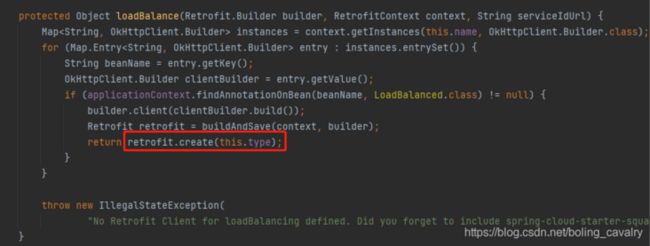
- Retrofit类并非spring-cloud的项目,而是来自Retrofit库,其create方法中使用了JDK的Proxy.newProxyInstance方法,该方法可以根据HelloService接口生成一个实现了该接口的实例:

- 在使用spring-cloud-square的retrofit + okhttp方案时,HelloService接口中使用的还是远程服务的服务名,而不是地址和端口,这是因为使用了spring-cloud-square-okhttp库,所以服务名转为地址+端口的逻辑与前文《spring-cloud-square源码速读(spring-cloud-square-okhttp篇)》保持一致
- 以上就是整个源码分析的结论了,我将涉及到的关联代码流程整理成简图,如下所示:
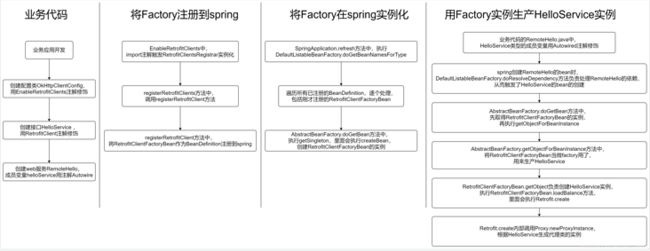
回顾应用如何使用spring-cloud-square-retrofit
- 新建配置类OkHttpClientConfig,使用了EnableRetrofitClients注解,向spring环境注册OkHttpClient.Builder实例:
@Configuration
@EnableRetrofitClients
class OkHttpClientConfig{
@Bean
@LoadBalanced
public OkHttpClient.Builder okHttpClientBuilder() {
return new OkHttpClient.Builder();
}
}
- 定义HelloService接口,用注解RetrofitClient修饰,注解的值是远程调用的服务名,里面声明hello方法,用注解GET修饰,注解的值是远程调用的接口的path:
@RetrofitClient("provider")
public interface HelloService {
@GET("/hello-obj")
Call hello(@Query("name") String name);
}
- 在业务要做远程调用的时候,用Autowired注解修饰HelloService接口,即可调用HelloService.hello方法,至于接口对应的实例来自哪里,开发者不必关注:
@RestController
public class RemoteHello {
@Autowired(required = false)
HelloService helloService;
@GetMapping("/remote-obj")
public HelloResponse hello(@RequestParam("name") String name) throws IOException {
return helloService.hello(name).execute().body();
}
}
- 以上就是咱们开发业务代码时使用spring-cloud-square的关键操作,接下来就从源码角度来分析这些操作到底发挥了什么作用
源码分析(类定义注册阶段)
- 回忆一下咱们写的OkHttpClientConfig.java,里面使用了注解EnableRetrofitClients,这就是本次阅读代码的入口:
@Retention(RetentionPolicy.RUNTIME)
@Target(ElementType.TYPE)
@Documented
@Import({ RetrofitConfiguration.class, RetrofitClientsRegistrar.class })
public @interface EnableRetrofitClients {
String[] value() default {};
String[] basePackages() default {};
Class[] basePackageClasses() default {};
Class[] defaultConfiguration() default {};
Class[] clients() default {};
}
- 从上述代码可见RetrofitConfiguration和RetrofitClientsRegistrar都会比实例化,RetrofitConfiguration过于简单就不看了,重点关注RetrofitClientsRegistrar,先来看它的类图,搞清楚继承和实现
- 如下图所示,RetrofitClientsRegistrar集成自AbstractRetrofitClientsRegistrar,而AbstractRetrofitClientsRegistrar又集成自ImportBeanDefinitionRegistrar
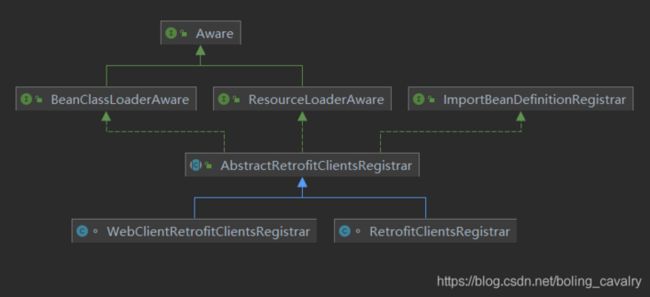
- 所以,RetrofitClientsRegistrar被实例化的时候,就相当于ImportBeanDefinitionRegistrar接口的实现类被实例化了,这个ImportBeanDefinitionRegistrar接口,相信熟悉spring的同学对其不会陌生,它是用来动态注册bean的,那么接下来的重点就是ImportBeanDefinitionRegistrar的registerBeanDefinitions方法的具体内容,看看它到底注册了什么bean
- registerBeanDefinitions方法的代码在AbstractRetrofitClientsRegistrar.java中(请在上面的类图中找到AbstractRetrofitClientsRegistrar的位置),如下所示,由于EnableRetrofitClients修饰的是咱们创建的OkHttpClientConfig.java,所以下面的入参AnnotationMetadata是OkHttpClientConfig类的注解信息:
@Override
public void registerBeanDefinitions(AnnotationMetadata metadata, BeanDefinitionRegistry registry) {
registerDefaultConfiguration(metadata, registry);
registerRetrofitClients(metadata, registry);
}
- 上述代码的第一个方法registerDefaultConfiguration是注册配置信息的,非重点,跳过
- 上述代码的第二个方法registerRetrofitClients,这是本篇的关键,请重点关注下面代码中的中文注释:
public void registerRetrofitClients(AnnotationMetadata metadata, BeanDefinitionRegistry registry) {
ClassPathScanningCandidateComponentProvider scanner = getScanner();
scanner.setResourceLoader(this.resourceLoader);
Set basePackages;
Map attrs = metadata.getAnnotationAttributes(getAnnotationClass().getName());
// 过滤条件:有RetrofitClient注解修饰的类,对应咱们代码中的HelloService.java
AnnotationTypeFilter annotationTypeFilter = new AnnotationTypeFilter(RetrofitClient.class);
final Class[] clients = attrs == null ? null : (Class[]) attrs.get("clients");
if (clients == null || clients.length == 0) {
scanner.addIncludeFilter(annotationTypeFilter);
basePackages = getBasePackages(metadata);
}
else {
final Set clientClasses = new HashSet<>();
basePackages = new HashSet<>();
for (Class clazz : clients) {
basePackages.add(ClassUtils.getPackageName(clazz));
clientClasses.add(clazz.getCanonicalName());
}
AbstractClassTestingTypeFilter filter = new AbstractClassTestingTypeFilter() {
@Override
protected boolean match(ClassMetadata metadata) {
String cleaned = metadata.getClassName().replaceAll("\\$", ".");
return clientClasses.contains(cleaned);
}
};
scanner.addIncludeFilter(new AllTypeFilter(Arrays.asList(filter, annotationTypeFilter)));
}
for (String basePackage : basePackages) {
Set candidateComponents = scanner.findCandidateComponents(basePackage);
for (BeanDefinition candidateComponent : candidateComponents) {
// 找到的结果就是HelloService接口
if (candidateComponent instanceof AnnotatedBeanDefinition) {
// verify annotated class is an interface
AnnotatedBeanDefinition beanDefinition = (AnnotatedBeanDefinition) candidateComponent;
AnnotationMetadata annotationMetadata = beanDefinition.getMetadata();
Assert.isTrue(annotationMetadata.isInterface(),
"@RetrofitClient can only be specified on an interface");
// 取得修饰HelloService类的RetrofitClient注解的所有属性
Map attributes = annotationMetadata
.getAnnotationAttributes(RetrofitClient.class.getCanonicalName());
// 根据这些属性,得到远程访问的服务名是provider
String name = getClientName(attributes);
// 在spring注册一个配置类,名为provider.RetrofitClientSpecification,
// 由于修饰HelloService的RetrofitClient注解并没有什么属性,所以这个配置类没有什么内容
registerClientConfiguration(registry, name, attributes.get("configuration"));
// 这个方法要重点关注,
// 入参annotationMetadata是HelloService的元信息,
// attributes是修饰HelloService类的RetrofitClient注解的所有属性
registerRetrofitClient(registry, annotationMetadata, attributes);
}
}
}
}
- 将上述代码中最后调用的registerRetrofitClient方法展开如下,这段代码做了件很重要的事情:注册BeanDefinition到spring,注册的name等于com.bolingcavalry.consumer.service.HelloService,对应的BeanDefinition的beanClass等于RetrofitClientFactoryBean:
private void registerRetrofitClient(BeanDefinitionRegistry registry, AnnotationMetadata annotationMetadata,
Map attributes) {
// 由于注解修饰的是HelloService类,所以这里className等于com.bolingcavalry.consumer.service.HelloService
String className = annotationMetadata.getClassName();
// 注意getFactoryBeanClass()方法,来自RetrofitClientsRegistrar类,返回值是RetrofitClientFactoryBean.class,
// 因此,RetrofitClientFactoryBean就被带入了definition中,
// 注意,这个definition变量的类型是BeanDefinitionBuilder,
// 其内部有个成员变量beanDefinition,此时该成员变量的beanClass字段已经被设置为RetrofitClientFactoryBean.class
BeanDefinitionBuilder definition = BeanDefinitionBuilder.genericBeanDefinition(getFactoryBeanClass());
validate(attributes);
// HelloService的RetrofitClient注解没有设置url属性,因此这里是空字符串
definition.addPropertyValue("url", getUrl(attributes));
// RetrofitClient注解的value属性配置为远程服务名,这里是provider
String name = getName(attributes);
definition.addPropertyValue("name", name);
// 类型就是HelloService
definition.addPropertyValue("type", className);
// by_type,意味着autowire注解修饰HelloService的时候,可以用HelloService获取对应的实现类
definition.setAutowireMode(AbstractBeanDefinition.AUTOWIRE_BY_TYPE);
String alias = name + "RetrofitClient";
// 通过BeanDefinitionBuilder得到了beanDefinition,
// 这个beanDefinition的beanClass字段在前面已经被设置为RetrofitClientFactoryBean.class
AbstractBeanDefinition beanDefinition = definition.getBeanDefinition();
beanDefinition.setPrimary(true);
String qualifier = getQualifier(attributes);
if (StringUtils.hasText(qualifier)) {
alias = qualifier;
}
// 将注册BeanDefinition所需的两个参数beanName和beanDefinition放入BeanDefinitionHolder对象中
BeanDefinitionHolder holder = new BeanDefinitionHolder(beanDefinition, className, new String[] { alias });
// 完成BeanDefinition在spring环境的注册,name等于com.bolingcavalry.consumer.service.HelloService,对应的BeanDefinition的beanClass等于RetrofitClientFactoryBean(注意,这很重要)
BeanDefinitionReaderUtils.registerBeanDefinition(holder, registry);
}
- 此刻,HelloService的类定义已经在spring完成了注册,接下来要看HelloService接口的实现类来自何处;
BeanDefinition中的RetrofitClientFactoryBean被实例化
- 在spring初始化过程中,上述红框中的代码会触发spring环境对HelloService接口实现类的实例化,完整的触发过程和详细堆栈就不细说了,这都是spring的标准处理流程,接下来会挑这里面的重点去看
- 首先就是大名鼎鼎的SpringApplication.refresh方法,这里面是bean的实例化逻辑,会执行一个重要方法,就是DefaultListableBeanFactory.doGetBeanNamesForType,这里面会遍历所有已注册的BeanDefinition,逐个处理,如下图:

- DefaultListableBeanFactory.doGetBeanNamesForType继续执行,会到下一个重点:根据BeanDefinition创建bean,堆栈如下,这是用条件断点得到的:
doGetBean:256, AbstractBeanFactory (org.springframework.beans.factory.support) [2]
getTypeForFactoryBean:1709, AbstractBeanFactory (org.springframework.beans.factory.support)
getTypeForFactoryBean:899, AbstractAutowireCapableBeanFactory (org.springframework.beans.factory.support)
isTypeMatch:637, AbstractBeanFactory (org.springframework.beans.factory.support)
doGetBeanNamesForType:583, DefaultListableBeanFactory (org.springframework.beans.factory.support)
getBeanNamesForType:542, DefaultListableBeanFactory (org.springframework.beans.factory.support)
beanNamesForTypeIncludingAncestors:265, BeanFactoryUtils (org.springframework.beans.factory)
findAutowireCandidates:1546, DefaultListableBeanFactory (org.springframework.beans.factory.support)
doResolveDependency:1343, DefaultListableBeanFactory (org.springframework.beans.factory.support)
resolveDependency:1300, DefaultListableBeanFactory (org.springframework.beans.factory.support)
resolveAutowiredArgument:887, ConstructorResolver (org.springframework.beans.factory.support)
createArgumentArray:791, ConstructorResolver (org.springframework.beans.factory.support)
instantiateUsingFactoryMethod:541, ConstructorResolver (org.springframework.beans.factory.support)
instantiateUsingFactoryMethod:1334, AbstractAutowireCapableBeanFactory (org.springframework.beans.factory.support)
createBeanInstance:1177, AbstractAutowireCapableBeanFactory (org.springframework.beans.factory.support)
doCreateBean:564, AbstractAutowireCapableBeanFactory (org.springframework.beans.factory.support)
createBean:524, AbstractAutowireCapableBeanFactory (org.springframework.beans.factory.support)
lambda$doGetBean$0:335, AbstractBeanFactory (org.springframework.beans.factory.support)
getObject:-1, 1485624601 (org.springframework.beans.factory.support.AbstractBeanFactory$$Lambda$488)
getSingleton:234, DefaultSingletonBeanRegistry (org.springframework.beans.factory.support)
doGetBean:333, AbstractBeanFactory (org.springframework.beans.factory.support) [1]
getBean:213, AbstractBeanFactory (org.springframework.beans.factory.support)
registerBeanPostProcessors:258, PostProcessorRegistrationDelegate (org.springframework.context.support)
registerBeanPostProcessors:762, AbstractApplicationContext (org.springframework.context.support)
refresh:567, AbstractApplicationContext (org.springframework.context.support)
refresh:769, SpringApplication (org.springframework.boot)
refresh:761, SpringApplication (org.springframework.boot)
refreshContext:426, SpringApplication (org.springframework.boot)
run:326, SpringApplication (org.springframework.boot)
loadContext:123, SpringBootContextLoader (org.springframework.boot.test.context)
loadContextInternal:99, DefaultCacheAwareContextLoaderDelegate (org.springframework.test.context.cache)
loadContext:124, DefaultCacheAwareContextLoaderDelegate (org.springframework.test.context.cache)
getApplicationContext:124, DefaultTestContext (org.springframework.test.context.support)
setUpRequestContextIfNecessary:190, ServletTestExecutionListener (org.springframework.test.context.web)
prepareTestInstance:132, ServletTestExecutionListener (org.springframework.test.context.web)
prepareTestInstance:244, TestContextManager (org.springframework.test.context)
postProcessTestInstance:138, SpringExtension (org.springframework.test.context.junit.jupiter)
lambda$invokeTestInstancePostProcessors$6:350, ClassBasedTestDescriptor (org.junit.jupiter.engine.descriptor)
execute:-1, 2001115307 (org.junit.jupiter.engine.descriptor.ClassBasedTestDescriptor$$Lambda$344)
executeAndMaskThrowable:355, ClassBasedTestDescriptor (org.junit.jupiter.engine.descriptor)
lambda$invokeTestInstancePostProcessors$7:350, ClassBasedTestDescriptor (org.junit.jupiter.engine.descriptor)
accept:-1, 1650113431 (org.junit.jupiter.engine.descriptor.ClassBasedTestDescriptor$$Lambda$343)
accept:-1, 796667727 (java.util.stream.StreamSpliterators$WrappingSpliterator$$Lambda$107)
accept:193, ReferencePipeline$3$1 (java.util.stream)
accept:175, ReferencePipeline$2$1 (java.util.stream)
forEachRemaining:1384, ArrayList$ArrayListSpliterator (java.util)
copyInto:482, AbstractPipeline (java.util.stream)
wrapAndCopyInto:472, AbstractPipeline (java.util.stream)
forEachRemaining:312, StreamSpliterators$WrappingSpliterator (java.util.stream)
forEachRemaining:743, Streams$ConcatSpliterator (java.util.stream)
forEachRemaining:742, Streams$ConcatSpliterator (java.util.stream)
forEach:580, ReferencePipeline$Head (java.util.stream)
invokeTestInstancePostProcessors:349, ClassBasedTestDescriptor (org.junit.jupiter.engine.descriptor)
lambda$instantiateAndPostProcessTestInstance$4:270, ClassBasedTestDescriptor (org.junit.jupiter.engine.descriptor)
execute:-1, 1547883191 (org.junit.jupiter.engine.descriptor.ClassBasedTestDescriptor$$Lambda$342)
execute:73, ThrowableCollector (org.junit.platform.engine.support.hierarchical)
instantiateAndPostProcessTestInstance:269, ClassBasedTestDescriptor (org.junit.jupiter.engine.descriptor)
lambda$testInstancesProvider$2:259, ClassBasedTestDescriptor (org.junit.jupiter.engine.descriptor)
get:-1, 795748540 (org.junit.jupiter.engine.descriptor.ClassBasedTestDescriptor$$Lambda$335)
orElseGet:267, Optional (java.util)
lambda$testInstancesProvider$3:258, ClassBasedTestDescriptor (org.junit.jupiter.engine.descriptor)
getTestInstances:-1, 361398902 (org.junit.jupiter.engine.descriptor.ClassBasedTestDescriptor$$Lambda$234)
getTestInstances:31, TestInstancesProvider (org.junit.jupiter.engine.execution)
lambda$prepare$0:101, TestMethodTestDescriptor (org.junit.jupiter.engine.descriptor)
execute:-1, 451312813 (org.junit.jupiter.engine.descriptor.TestMethodTestDescriptor$$Lambda$334)
execute:73, ThrowableCollector (org.junit.platform.engine.support.hierarchical)
prepare:100, TestMethodTestDescriptor (org.junit.jupiter.engine.descriptor)
prepare:65, TestMethodTestDescriptor (org.junit.jupiter.engine.descriptor)
lambda$prepare$1:111, NodeTestTask (org.junit.platform.engine.support.hierarchical)
execute:-1, 1008315045 (org.junit.platform.engine.support.hierarchical.NodeTestTask$$Lambda$182)
execute:73, ThrowableCollector (org.junit.platform.engine.support.hierarchical)
prepare:111, NodeTestTask (org.junit.platform.engine.support.hierarchical)
execute:79, NodeTestTask (org.junit.platform.engine.support.hierarchical)
accept:-1, 1976870338 (org.junit.platform.engine.support.hierarchical.SameThreadHierarchicalTestExecutorService$$Lambda$201)
forEach:1259, ArrayList (java.util)
invokeAll:38, SameThreadHierarchicalTestExecutorService (org.junit.platform.engine.support.hierarchical)
lambda$executeRecursively$5:143, NodeTestTask (org.junit.platform.engine.support.hierarchical)
execute:-1, 1647809929 (org.junit.platform.engine.support.hierarchical.NodeTestTask$$Lambda$197)
execute:73, ThrowableCollector (org.junit.platform.engine.support.hierarchical)
lambda$executeRecursively$7:129, NodeTestTask (org.junit.platform.engine.support.hierarchical)
invoke:-1, 928294079 (org.junit.platform.engine.support.hierarchical.NodeTestTask$$Lambda$196)
around:137, Node (org.junit.platform.engine.support.hierarchical)
lambda$executeRecursively$8:127, NodeTestTask (org.junit.platform.engine.support.hierarchical)
execute:-1, 728885526 (org.junit.platform.engine.support.hierarchical.NodeTestTask$$Lambda$195)
execute:73, ThrowableCollector (org.junit.platform.engine.support.hierarchical)
executeRecursively:126, NodeTestTask (org.junit.platform.engine.support.hierarchical)
execute:84, NodeTestTask (org.junit.platform.engine.support.hierarchical)
accept:-1, 1976870338 (org.junit.platform.engine.support.hierarchical.SameThreadHierarchicalTestExecutorService$$Lambda$201)
forEach:1259, ArrayList (java.util)
invokeAll:38, SameThreadHierarchicalTestExecutorService (org.junit.platform.engine.support.hierarchical)
lambda$executeRecursively$5:143, NodeTestTask (org.junit.platform.engine.support.hierarchical)
execute:-1, 1647809929 (org.junit.platform.engine.support.hierarchical.NodeTestTask$$Lambda$197)
execute:73, ThrowableCollector (org.junit.platform.engine.support.hierarchical)
lambda$executeRecursively$7:129, NodeTestTask (org.junit.platform.engine.support.hierarchical)
invoke:-1, 928294079 (org.junit.platform.engine.support.hierarchical.NodeTestTask$$Lambda$196)
around:137, Node (org.junit.platform.engine.support.hierarchical)
lambda$executeRecursively$8:127, NodeTestTask (org.junit.platform.engine.support.hierarchical)
execute:-1, 728885526 (org.junit.platform.engine.support.hierarchical.NodeTestTask$$Lambda$195)
execute:73, ThrowableCollector (org.junit.platform.engine.support.hierarchical)
executeRecursively:126, NodeTestTask (org.junit.platform.engine.support.hierarchical)
execute:84, NodeTestTask (org.junit.platform.engine.support.hierarchical)
submit:32, SameThreadHierarchicalTestExecutorService (org.junit.platform.engine.support.hierarchical)
execute:57, HierarchicalTestExecutor (org.junit.platform.engine.support.hierarchical)
execute:51, HierarchicalTestEngine (org.junit.platform.engine.support.hierarchical)
execute:108, EngineExecutionOrchestrator (org.junit.platform.launcher.core)
execute:88, EngineExecutionOrchestrator (org.junit.platform.launcher.core)
lambda$execute$0:54, EngineExecutionOrchestrator (org.junit.platform.launcher.core)
accept:-1, 607932305 (org.junit.platform.launcher.core.EngineExecutionOrchestrator$$Lambda$150)
withInterceptedStreams:67, EngineExecutionOrchestrator (org.junit.platform.launcher.core)
execute:52, EngineExecutionOrchestrator (org.junit.platform.launcher.core)
execute:96, DefaultLauncher (org.junit.platform.launcher.core)
execute:75, DefaultLauncher (org.junit.platform.launcher.core)
startRunnerWithArgs:71, JUnit5IdeaTestRunner (com.intellij.junit5)
startRunnerWithArgs:33, IdeaTestRunner$Repeater (com.intellij.rt.junit)
prepareStreamsAndStart:221, JUnitStarter (com.intellij.rt.junit)
main:54, JUnitStarter (com.intellij.rt.junit)
- 根据上述堆栈,要细看AbstractBeanFactory的doGetBean方法,请关注中文注释:
protected T doGetBean(
String name, @Nullable Class requiredType, @Nullable Object[] args, boolean typeCheckOnly)
throws BeansException {
// 入参name等于"com.bolingcavalry.consumer.service.HelloService"
String beanName = transformedBeanName(name);
Object beanInstance;
// Eagerly check singleton cache for manually registered singletons.
Object sharedInstance = getSingleton(beanName);
// sharedInstance等于null,因此下面的if判断不成立
if (sharedInstance != null && args == null) {
if (logger.isTraceEnabled()) {
if (isSingletonCurrentlyInCreation(beanName)) {
logger.trace("Returning eagerly cached instance of singleton bean '" + beanName +
"' that is not fully initialized yet - a consequence of a circular reference");
}
else {
logger.trace("Returning cached instance of singleton bean '" + beanName + "'");
}
}
beanInstance = getObjectForBeanInstance(sharedInstance, name, beanName, null);
}
else {
// Fail if we're already creating this bean instance:
// We're assumably within a circular reference.
if (isPrototypeCurrentlyInCreation(beanName)) {
throw new BeanCurrentlyInCreationException(beanName);
}
// Check if bean definition exists in this factory.
BeanFactory parentBeanFactory = getParentBeanFactory();
// parentBeanFactory等于null,因此下面的if判断不成立
if (parentBeanFactory != null && !containsBeanDefinition(beanName)) {
// Not found -> check parent.
String nameToLookup = originalBeanName(name);
if (parentBeanFactory instanceof AbstractBeanFactory) {
return ((AbstractBeanFactory) parentBeanFactory).doGetBean(
nameToLookup, requiredType, args, typeCheckOnly);
}
else if (args != null) {
// Delegation to parent with explicit args.
return (T) parentBeanFactory.getBean(nameToLookup, args);
}
else if (requiredType != null) {
// No args -> delegate to standard getBean method.
return parentBeanFactory.getBean(nameToLookup, requiredType);
}
else {
return (T) parentBeanFactory.getBean(nameToLookup);
}
}
// typeCheckOnly等于true,因此下面的if判断不成立
if (!typeCheckOnly) {
markBeanAsCreated(beanName);
}
StartupStep beanCreation = this.applicationStartup.start("spring.beans.instantiate")
.tag("beanName", name);
try {
if (requiredType != null) {
beanCreation.tag("beanType", requiredType::toString);
}
// 前面咱们分析过,BeanDefinition已经注册到spring环境了,
// 此处调用getMergedLocalBeanDefinition即可取得这个BeanDefinition
RootBeanDefinition mbd = getMergedLocalBeanDefinition(beanName);
checkMergedBeanDefinition(mbd, beanName, args);
// Guarantee initialization of beans that the current bean depends on.
String[] dependsOn = mbd.getDependsOn();
// HelloService的BeanDefinition没有依赖,
// 因此dependsOn等于null,下面的if不成立
if (dependsOn != null) {
for (String dep : dependsOn) {
if (isDependent(beanName, dep)) {
throw new BeanCreationException(mbd.getResourceDescription(), beanName,
"Circular depends-on relationship between '" + beanName + "' and '" + dep + "'");
}
registerDependentBean(dep, beanName);
try {
getBean(dep);
}
catch (NoSuchBeanDefinitionException ex) {
throw new BeanCreationException(mbd.getResourceDescription(), beanName,
"'" + beanName + "' depends on missing bean '" + dep + "'", ex);
}
}
}
// Create bean instance.
// HelloService的bean是单例,因此下面的if判断成立
if (mbd.isSingleton()) {
// 这里是创建bean的关键!!!
// getSingleton传入一个lambda表达式,方法内会调用该表达式,
sharedInstance = getSingleton(beanName, () -> {
try {
// 根据BeanDefinition创建bean,
// 实际上执行的是AbstractAutowireCapableBeanFactory.createBean方法
return createBean(beanName, mbd, args);
}
catch (BeansException ex) {
// Explicitly remove instance from singleton cache: It might have been put there
// eagerly by the creation process, to allow for circular reference resolution.
// Also remove any beans that received a temporary reference to the bean.
destroySingleton(beanName);
throw ex;
}
});
beanInstance = getObjectForBeanInstance(sharedInstance, name, beanName, mbd);
}
else if (mbd.isPrototype()) {
// It's a prototype -> create a new instance.
Object prototypeInstance = null;
try {
beforePrototypeCreation(beanName);
prototypeInstance = createBean(beanName, mbd, args);
}
finally {
afterPrototypeCreation(beanName);
}
beanInstance = getObjectForBeanInstance(prototypeInstance, name, beanName, mbd);
}
else {
String scopeName = mbd.getScope();
if (!StringUtils.hasLength(scopeName)) {
throw new IllegalStateException("No scope name defined for bean ´" + beanName + "'");
}
Scope scope = this.scopes.get(scopeName);
if (scope == null) {
throw new IllegalStateException("No Scope registered for scope name '" + scopeName + "'");
}
try {
Object scopedInstance = scope.get(beanName, () -> {
beforePrototypeCreation(beanName);
try {
return createBean(beanName, mbd, args);
}
finally {
afterPrototypeCreation(beanName);
}
});
beanInstance = getObjectForBeanInstance(scopedInstance, name, beanName, mbd);
}
catch (IllegalStateException ex) {
throw new ScopeNotActiveException(beanName, scopeName, ex);
}
}
}
catch (BeansException ex) {
beanCreation.tag("exception", ex.getClass().toString());
beanCreation.tag("message", String.valueOf(ex.getMessage()));
cleanupAfterBeanCreationFailure(beanName);
throw ex;
}
finally {
beanCreation.end();
}
}
return adaptBeanInstance(name, beanInstance, requiredType);
}
- 至此,RetrofitClientFactoryBean已经完成了实例化,接下来要去看HelloService接口背后的bean是怎么创建的
HelloService对应的bean是如何创建的
- 回顾一下,咱们的应用代码中用到HelloService的场景,如下图红框所示,使用Autowired注解修饰HelloService:
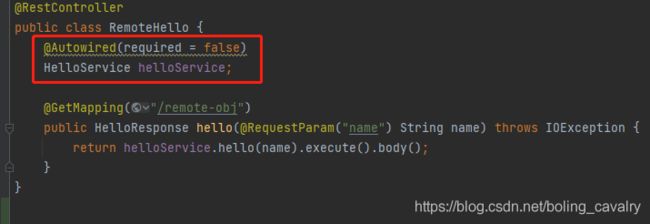
- 首先,上图中的RemoteHello是一定会创建bean的,在创建的过程中,DefaultListableBeanFactory.doResolveDependency方法负责处理RemoteHello依赖的bean,如下图所示,在此处触发了HelloService的bean的实例化

- 辗转反侧,再次走到了AbstractBeanFactory.doGetBean方法,这次会执行下图第二个红框中的getObjectForBeanInstance方法:

- 然后到了最关键的位置:AbstractBeanFactory.getObjectForBeanInstance方法,这里面将RetrofitClientFactoryBean当做factory用了,用来生产HelloService:

- 将上图红框2中的getObjectFromFactoryBean方法继续展开,进入FactoryBeanRegistrySupport.doGetObjectFromFactoryBean方法,这里完成了从spring框架到应用自定义之间的过渡:将bean的创建交给应用自己注册的Factory来处理:
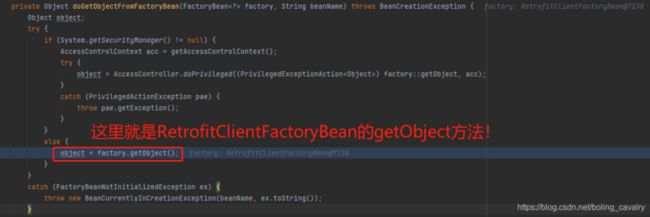
- 在RetrofitClientFactoryBean.getObject中,执行loadBalance(builder, context, serviceIdUrl):
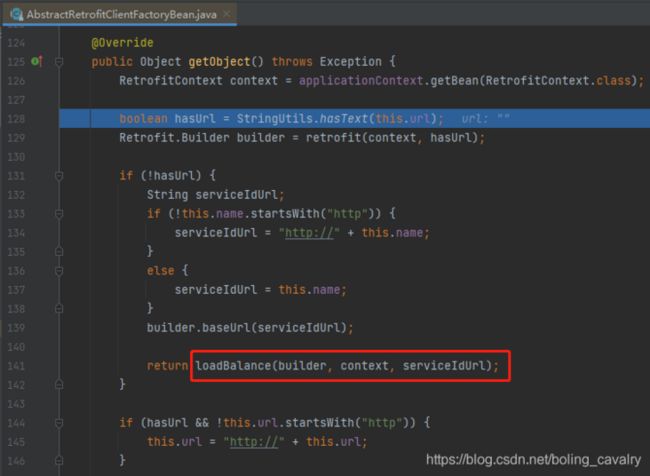
- loadBalance的实现在RetrofitClientFactoryBean中:
protected Object loadBalance(Retrofit.Builder builder, RetrofitContext context, String serviceIdUrl) {
// 应用代码的OkHttpClientConfig.java中,okHttpClientBuilder方法生成了OkHttpClient.Builder实例,此处的instances中就是这个实例
Map instances = context.getInstances(this.name, OkHttpClient.Builder.class);
for (Map.Entry entry : instances.entrySet()) {
String beanName = entry.getKey();
OkHttpClient.Builder clientBuilder = entry.getValue();
// 应用代码的OkHttpClientConfig.java中,okHttpClientBuilder方法上已经用了LoadBalanced注解,
//所以下面这个if判断为true
if (applicationContext.findAnnotationOnBean(beanName, LoadBalanced.class) != null) {
// 创建了OkHttpClient实例,传给了这个Retrofit.Builder
builder.client(clientBuilder.build());
// 使用这个Retrofit.Builder去创建retrofit,相当于把上面创建的OkHttpClient实例带给了retrofit
// 所以,这个retrofit实例的底层就是OkHttpClient
Retrofit retrofit = buildAndSave(context, builder);
// type的类型是HelloService,
// retrofit.create就是要创建一个实例,该实例实现了HelloService接口
return retrofit.create(this.type);
}
}
throw new IllegalStateException(
"No Retrofit Client for loadBalancing defined. Did you forget to include spring-cloud-starter-square-okhttp?");
}
- 从上面的分析可见,咱们只写HelloService接口不写HelloService实现的关键就是retrofit.create方法,传入了一个接口定义,就能返回该接口的实现类的实例
- 说实话retrofit.create的源码并不属于spring-cloud-square,而是Retrofit自己的,在本文中看这段源码属于超纲,但我还是忍不住要看一下:
public T create(final Class service) {
// 一些检查,例如service是不是接口
validateServiceInterface(service);
return (T)
// 这个实例是通过JDK的Proxy.newProxyInstance创建的
Proxy.newProxyInstance(
service.getClassLoader(),
new Class[] {service},
new InvocationHandler() {
private final Platform platform = Platform.get();
private final Object[] emptyArgs = new Object[0];
// 业务应用执行HelloService的hello方法时,实际上执行的是下面的方法
@Override
public @Nullable Object invoke(Object proxy, Method method, @Nullable Object[] args)
throws Throwable {
// If the method is a method from Object then defer to normal invocation.
if (method.getDeclaringClass() == Object.class) {
return method.invoke(this, args);
}
args = args != null ? args : emptyArgs;
return platform.isDefaultMethod(method)
? platform.invokeDefaultMethod(method, service, proxy, args)
: loadServiceMethod(method).invoke(args);
}
});
}
- 至此终于真像大白,最终还是用Proxy.newProxyInstance生成了HelloService的代理类实例,作为HelloService.hello调用背后的真正实现
- 最后似乎还有一点疑问,就是HelloService的RetrofitClient注解的属性是服务名provider,那么真正网络请求的时候,是如何转成真实的地址和端口的呢?
- 再回头看看咱应用consumer-retrofit-okhttp的pom.xml文件,如下图红框所示,和前文一样,这里也使用了spring-cloud-square-okhttp,而且咱们写的OkHttpClientConfig.java和前文也是一样的,所以,根据服务名获取地址和端口的操作依旧可以用前文的分析来解释:
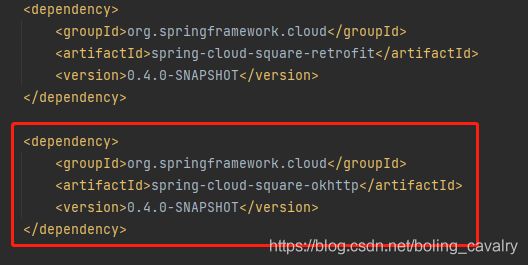
- 至于HelloService.hello方法,如何对应到web请求,请容我说一声:这是retrofit和okhttp之间的事情,在这里算是超纲了,篇幅所限,实在展不开了...
尾记:关于另一种spring-cloud-square类型:retrofit + webflux
- 之前的文章已经分析过,spring-cloud-square一共有三种类型,如下图所示,两个绿框中的源码都分析过了,还剩下的只有红色的retrofit + webflux组合:

- 欣宸还要再写一篇retrofit + webflux源码分析的文章?不不不,读源码太累,写出的文章,聪明的您读起来也累,所以就此打住吧
- 如果勤奋努力的您想独立阅读分析retrofit + webflux源码,这里给您一个建议,还记得本篇前面的那个类图吗,如下图,使用retrofit + webflux的时候,会用到spring-cloud-square-retrofit-webclient.jar,这个jar里面也有OkHttpClientConfig注解,它的import会实例化下图红框中的类,这个类就是您阅读源码的入口:

- 至此《spring-cloud-square学习》系列已经全部完成,希望这四篇文章可以帮助您全面掌握spring-cloud-square,在您的项目中对远程调用的操作更加得心应手;
你不孤单,欣宸原创一路相伴
- Java系列
- Spring系列
- Docker系列
- kubernetes系列
- 数据库+中间件系列
- DevOps系列
欢迎关注公众号:程序员欣宸
微信搜索「程序员欣宸」,我是欣宸,期待与您一同畅游Java世界...
https://github.com/zq2599/blog_demos















